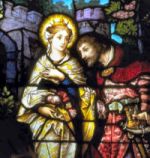To Walk, to Build, to Witness, Always with the Cross of Christ
by Pope Francis
In these three readings, I see a common element: that of movement. In the first reading, it is the movement of a journey; in the second reading, the movement of building the Church; in the third, in the Gospel, the movement involved in professing the faith. Journeying, building, professing.
Journeying. "O house of Jacob, come, let us walk in the light of the Lord" (Is 2:5). This is the first thing that God said to Abraham: Walk in my presence and live blamelessly. Journeying: our life is a journey, and when we stop moving, things go wrong. Always journeying, in the presence of the Lord, in the light of the Lord, seeking to live with the blamelessness that God asked of Abraham in his promise.
Building. Building the Church. We speak of stones: stones are solid; but living stones, stones anointed by the Holy Spirit. Building the Church, the Bride of Christ, on the cornerstone that is the Lord himself. This is another kind of movement in our lives: building.
Thirdly, professing. We can walk as much as we want, we can build many things, but if we do not profess Jesus Christ, things go wrong. We may become a charitable NGO, but not the Church, the Bride of the Lord. When we are not walking, we stop moving. When we are not building on the stones, what happens? The same thing that happens to children on the beach when they build sandcastles: everything is swept away, there is no solidity. When we do not profess Jesus Christ, the saying of Léon Bloy comes to mind: "Anyone who does not pray to the Lord prays to the devil." When we do not profess Jesus Christ, we profess the worldliness of the devil, a demonic worldliness.
Journeying, building, professing. But things are not so straightforward, because in journeying, building, professing, there can sometimes be jolts, movements that are not properly part of the journey: movements that pull us back.
This Gospel continues with a situation of a particular kind. The same Peter who professed Jesus Christ, now says to him: You are the Christ, the Son of the living God. I will follow you, but let us not speak of the Cross. That has nothing to do with it. I will follow you on other terms, but without the Cross. When we journey without the Cross, when we build without the Cross, when we profess Christ without the Cross, we are not disciples of the Lord, we are worldly: we may be bishops, priests, cardinals, popes, but not disciples of the Lord.
My wish is that all of us, after these days of grace, will have the courage, yes, the courage, to walk in the presence of the Lord, with the Lord’s Cross; to build the Church on the Lord’s blood which was poured out on the Cross; and to profess the one glory: Christ crucified. And in this way, the Church will go forward.
My prayer for all of us is that the Holy Spirit, through the intercession of the Blessed Virgin Mary, our Mother, will grant us this grace: to walk, to build, to profess Jesus Christ crucified. Amen.
© Libreria Editrice Vaticana 2013
This item 10191 digitally provided courtesy of CatholicCulture.org






